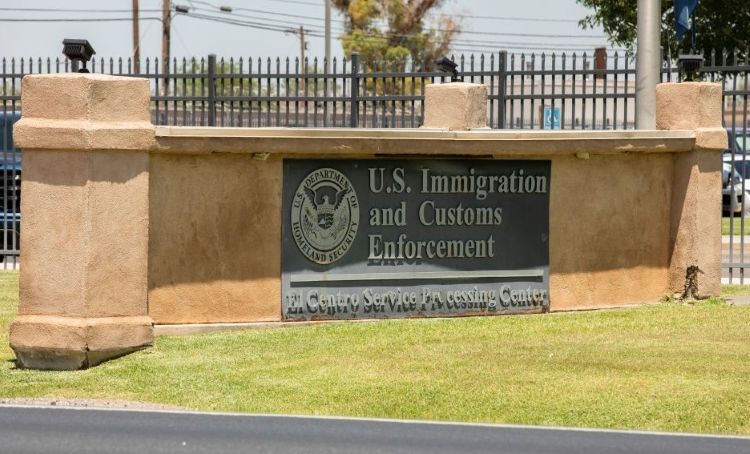Know Your Rights: What To Do if ICE Comes To Your Door

ICE Raids: Motion Law Is Here To Help You
At Motion Law, we want to ensure you are prepared should you ever find yourself in a situation involving Immigration and Customs Enforcement (ICE). Below are important rights and steps to remember if ICE comes to your door.
We have also attached a more detailed guide in both English and Spanish put together by the National Immigration Law Center (NILC). Should you need this resource guide in an additional language, please visit this link.
What are your Rights?
- You Have the Right to Remain Silent
If ICE agents come to your door, you are not required to answer their questions. You have the right to remain silent. You may say, “I am exercising my right to remain silent and would like to speak with my attorney.”
- You Have the Right to Ask for Identification
ICE officers must identify themselves and show their badges if they are at your door. You can ask to see their identification before engaging with them. If they refuse to show their identification, you are under no obligation to open the door.
- You Do Not Have to Let ICE In Without a Warrant
You are not required to open the door unless ICE has a warrant signed by a judge. If the officers claim they have a warrant, ask them to slide it under the door or hold it up to the window so you can examine it. Make sure the warrant is signed by a judge and specifies the address where they are authorized to search.
If the ICE agents do not have a valid warrant, you can refuse entry. Politely say, “I do not consent to your entry,” and do not open the door.
- You Have the Right to Call an Attorney
If you are detained or questioned by ICE, you have the right to contact an attorney. If you do not have an attorney, we can help you find legal representation. It is crucial that you do not sign anything or make any decisions without consulting an attorney.
- Stay Calm and Document the Encounter
If ICE comes to your door, try to stay calm and avoid confrontation. You can also record the interaction if it is safe to do so, as long as it does not interfere with their activities. This documentation can be useful if there are any legal issues or concerns later on.
- If You Are Arrested, You Have the Right to Know Why
If ICE arrests you, they must tell you the reason for the arrest. You also have the right to know what charges you are facing and may request a hearing before an immigration judge.
- Know the Rights of Family Members
If you have family members in your home, know that they also have rights. They do not have to answer questions from ICE, and they also do not have to open the door without a warrant.
- WHEN TO CALL OUR OFFICE
WE are here to help our clients. If you or a family member has been detained, please call our office. Let our receptionist know that this pertains to a detained client so they are able to handle the call adequately.
Areas Protected from ICE Enforcement
In addition to the rights listed above, it’s important to be aware of certain areas that are currently protected from ICE enforcement. These areas provide a sanctuary from immigration enforcement in many cases, and ICE is generally prohibited from conducting enforcement actions in these locations. Protected areas include, but are not limited to:
- Schools: ICE cannot enter or conduct operations at schools (including K-12 schools, colleges, and universities) without a judicial warrant.
- Medical or Mental Healthcare Facilities: This includes hospitals, doctors’ offices, and mental health facilities where individuals receive care. Immigration agents are generally not allowed to enter these places unless they have a warrant.
- Places of Worship or Religious Studies: ICE is prohibited from conducting operations at religious institutions like churches, synagogues, mosques, and other places of worship.
- Places Where Children Gather: This includes daycare centers, playgrounds, and other locations where children are present.
- Social Services Establishments: Locations that provide social services or support to individuals, such as food banks, homeless shelters, and domestic violence shelters, are also generally protected.
- Places of Disaster or Emergency Response/Relief: Areas providing emergency relief after disasters, such as Red Cross shelters or similar facilities, are generally off-limits to ICE enforcement.
- Ceremonial or Religious Events: ICE cannot carry out enforcement actions at funerals, graveside ceremonies, weddings, or other religious or civil ceremonies and observances.
- Public Events: ICE typically refrains from enforcement in locations where public demonstrations, rallies, or parades are taking place.
Please be aware that while these areas are protected from ICE enforcement, there are exceptions in certain emergency situations. However, knowing these protections can provide a sense of security and help prevent unnecessary disruptions in these sensitive locations.
Frequently Asked Questions
For more details about this topic, please read the answers to some Frequently Asked Questions from the National Immigration Law Center website in both English or Spanish:
https://www.nilc.org/resources/know-your-rights-what-to-do-if-arrested-detained-immigration/
We hope this information helps you feel empowered and informed should you ever face an encounter with ICE. It is important to understand your rights and take steps to protect yourself and your family. If you have any questions or need further assistance, please do not hesitate to contact our office. We are here to help you every step of the way. Stay safe and know that we are here to support you!